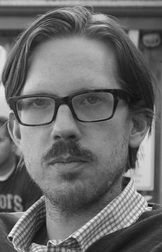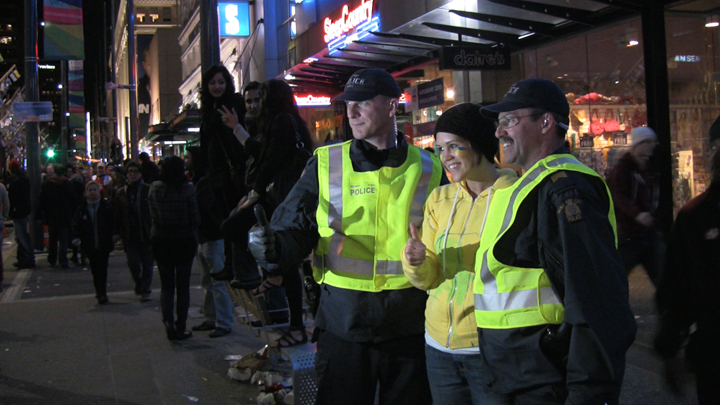 Michael Vass Photo by June Pak Michael Vass is a filmmaker and writer based in Toronto. His award-winning short films have screened at numerous film festivals and have been broadcast internationally. His critical writings have appeared in the film journal Cineaction and the Philadelphia-based publication MACHETE. Michael received his BFA from Simon Fraser University and his MFA from York University. He is also an alumnus of the Canadian Film Centre. RUSTY TALK WITH MICHAEL VASS Kathryn Mockler: How did you first get into filmmaking? Michael Vass: I’m not completely sure. As a child I think I was drawn to performing—for instance, I loved stand up comedy at what now seems a weirdly young age (I couldn’t possibly have understood most of the jokes)—but I don’t think I was ever completely comfortable performing myself, at least not after a certain age. So I started writing stories then making videos, probably initially as a way of performing out of sight. When I was 11 or so, I started making little home movies with my friends and my sister. We’d make parody sequels for movies that were popular at the time. I think we made Home Alone 2 and Die Hard 3 (which we called Die the Hardest) before either sequel really existed. Since then I’ve just kept making things. As a teenager my interest in film intensified, then I went to film school where I was exposed to all kinds of films that fascinated and excited me. KM: Was there a writer or filmmaker that had a big impact on you? MV: There are too many too name, and it tends to shift somewhat depending on what I’m working on. For my most recent project, Vancouver #1-13 (Notes for a report…), I was influenced mostly by filmmakers working in the somewhat amorphous genre that’s sometimes called the essay film, which has long fascinated me. The term itself isn’t that important, it’s just a way of grouping together a kind of film that’s always been around, which combines elements of fiction and documentary, and which tends to have a significant writing component—usually in the form of a first person voice-over. It’s generally a more self-reflexive and personal way of using various cinematic techniques, and it often addresses somewhat political themes, directly or indirectly. Film/video-makers like Chris Marker, Jean-Pierre Gorin, Jean-Luc Godard, Harun Farocki, and John Smith had a particularly strong impact on me as I was working on the film, as did the writers Robert Musil, W.G. Sebald, Thomas Bernhard, and Roberto Bolano. KM: Can you describe your current film project that's screening in Philadelphia? MV: It’s called Vancouver #1-13 (Notes for a report…) and, as I mentioned, it’s a kind of essay film, which mixes documentary and fiction to examine security and protest in the society of the spectacle. It uses documentary footage from the 2010 Vancouver Olympics and the G20 debacle in Toronto, and adds a voice-over by a fictional intelligence agent analyzing the footage. It is currently screening as an installation in the group exhibition “First Among Equals” at the Institute for Contemporary Art in Philadelphia (April 11-22). My participation in show came about because of my involvement with the Philadelphia-based gallery Marginal Utility and the Machete Group which jointly puts out the publication MACHETE, for which I’ve been writing about film for the past couple years. KM: What is the best thing about being a filmmaker and the worst thing? MV: The best thing about being an artist of any kind is that it lets you structure your life around engaging with the world and your experiences and interests on your own terms, or at least on terms of your choosing—creatively, critically, reflectively…however you want. The worst thing is that this kind of activity rarely pays the bills, so usually you have to find some other way of making a living. Sometimes this can be something tangentially related to your activities as an artist (like teaching), or sometimes it is something completely unrelated, but either way it tends to eat up a lot of time and energy you’d rather be spending working on your own projects. This financial downside is exponentially worse as a filmmaker because filmmaking is so expense, logistically complicated, and time consuming, so if you want to make your own films, it can obviously be quite difficult. But artists shouldn’t whine too much about jobs and money – almost everyone hates there job and would rather not be doing it, at least we have something we want to be doing. KM: Your funniest filmmaking moment. MV: I directed a film at the Canadian Film Centre in 2006 called Skinheads. The film is a dark comedy and isn’t exactly about actual skinheads in any real way, it just appropriates some of the iconography of skinhead culture for other purposes. We put a trailer on YouTube to promote the film at festivals, etc. However, we didn’t anticipate that there are a lot of actual skinheads all over the world searching online for skinhead related stuff. The trailer has received a ton of views in the past year, along with some affronted comments by Neo-Nazi types. Somehow the trailer must have gone viral in some minor way recently on skinhead sites or something and has generated some negative attention. Maybe that’s not ha-ha funny, but I find it kind of amusing—as long is there is an ocean between the offended skinheads and me. Vancouver #1-13 (Notes for a Report...) currently screening as an installation in the group exhibition “First Among Equals” at the Institute for Contemporary Art in Philadelphia (April 11-22).
|
Rusty Talk
Rusty Talk Editor: Archives
November 2017
Categories
All
|


 RSS Feed
RSS Feed
